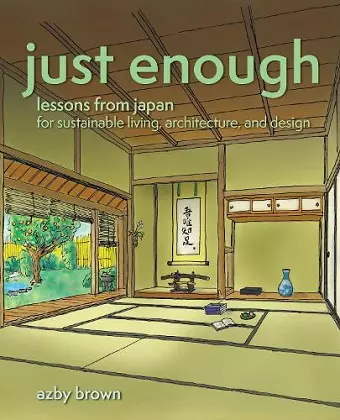Just Enough
Lessons from Japan for Sustainable Living, Architecture, and Design
Format:Paperback
Publisher:Stone Bridge Press
Published:11th Aug '22
Currently unavailable, our supplier has not provided us a restock date

How the mindset of traditional Japanese society can guide our own efforts to lead a green lifestyle today.
If we want to live sustainably, how should we feel about nature? About waste? About our forests and rivers? About food? Just Enough is a book of stories and sketches that give valuable insight into what it is like to live in a sustainable society by describing life in Japan some two hundred years ago, during the late Edo period, when cities and villages faced many of the same environmental challenges we do today and met them beautifully and inventively.
"An immersive study that takes a fascinating look at how ethically sound living can permeate an entire culture. It makes a persuasive case for nature-based solutions to current environmental challenges."
—Ho Lin, Foreword Reviews
“I cannot overstate the importance ofJust Enough. It should be required reading for anyone who wants to help make today’s world more sustainable, and capable of surviving the current imbalances of climate, energy, and resource distribution. . . . There’s no other way to say it: This is an extraordinary book that holds the keys we’re looking for to rebalance both our planet and our own lives. Read it, please.”
—Sarah Susanka, Architect and author of The Not So Big House series, and The Not So Big Life
“As we all look forward with hope for a cradle to cradle world, Azby Brown honors us with the great gift of seeing the past of Japan with fresh eyes. I was born in Japan in 1951; I know firsthand what inspiration can be found in its history of exquisitely elegant and effective solutions to everyday needs as we create the designs of the future.”
—William McDonough, Award-winning sustainable architect, co-author of Cradle to Cradle: Remaking the Way We Make Things
“Azby Brown's book Just Enough, using excellent examples from Edo-period Japan, proves that we have surrounded ourselves with many things that we don't need to live sustainably and happily. This is an important warning for future development, one that should make us all stop and think.”
—Shigeru Ban, Architect, recipient of the Thomas Jefferson Medal in Architecture and the Grande Medaille d'Or, Academie d'Architecture
"The people of the Edo period intelligently managed their homes, fields, and forests, developed innovative designs for the things they needed, and maintained a sustainable society for three hundred years without a major catastrophe. This book conveys the secrets of that self-sufficient society with great clarity in text and sketches—knowledge that has great meaning for us as we face the immense challenges of life in our time."
—Dr. Terunobu Fujimori, Award-winning green architect and architectural historian, Professor at the Institute of Industrial Science, University of Tokyo
“Truly an eye-opener. Brown takes us behind the scenes, revealing the complex and ingenious techniques that put Japanese traditional life in harmony with nature. An indispensable reference for anyone wanting to know the secret formulae that made old Japanese life what it was.”
—Alex Kerr, author of Dogs and Demons and Lost Japan
“The hardheaded practicality and the immense optimism of this book are forces to be reckoned with. As Brown examines how necessity was turned into opportunity, he lays out his hope that the urgency of our current ecological crisis will spur similarly focused change and ingenuity...As the globe gets smaller and we find ourselves finally having to relinquish the illusion of an earth that can sustain our current lifestyles indefinitely, it seems that Brown has found the perfect example of how it might be done: with frugality and restraint, certainly, but also with grace, purpose, and beauty...”
—Anna Kunnecke, The Japan Times
"Azby Brown's Just Enough convincingly argues that the growing movement for sustainable living in the twenty-first century can learn from Edo's land and resource practices and its culture of restraint."
—Jared Braiterman, Huffington Post
ISBN: 9781611720778
Dimensions: unknown
Weight: unknown
232 pages